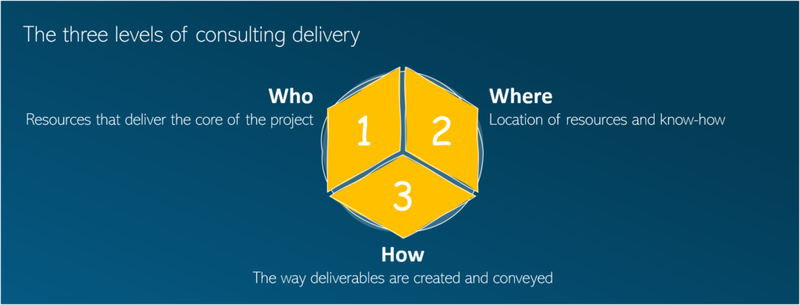
Virtualize it! Three virtual delivery levels of consulting in times of #remoteX
Four weeks ago, I published an article about the importance and the success factors of remote work for industry companies (Link). How time flies. Back then, we were only talking about shelter-in-place ordinances and shut-downs. Now, the crisis shows its ugly face and all of us need to accept social distancing as not only a matter of sanity but an inevitable measure for large parts of the global population.
Companies have acted as well. They ban visits from external business partners and established work from home as the new daily business. However, one of the industries that will be affected most, is the professional services industry and especially management consulting. For decades, their business model was based on face-time. Not the Apple invention, I mean the good old handshake and presence on-site with the client. The old credo persisted: Clients only pay whom they see!
Talking to clients at APADUA, we realized that many consulting projects are either paused or entirely stopped. Also, their pipeline for traditional projects seems to be frozen and so are its resources. We discussed what types of projects can still be conducted and what service providers are prepared for full scale remote consulting. To better understand this we cur the three filets of consulting delivery:

We have picked some company examples that offer virtual consulting or elements of it – not as an emergency strategy in times of Covid19, but as their standard business model.

Management Consulting – Transformation and Digitalization
Companies like CrowdConsultants in Berlin or a-connect in Zürich have created a successful business based on resources recruited from the crowd. Having cut the boundaries of fixed staff and centers of competences, such companies have become methodology experts with back-office functions for quality and key account management. Although, not entirely virtualized and disruptive nowadays, they have contributed to the virtualization of the recruitment of the best experts for client demands and are miles ahead of traditional management consulting firms that depend on high utilization rates and hate seeing their consultants “on the beach”. Traditional consulting companies using external resources are usually motivated by covering peak loads or flexibilities of their workforce to a lower two-digit percentage.

Trend Research and Strategy Benchmarking and other Studies
Custom research projects and market studies are service types that traditionally do not require physical face-time with clients. While quantitative research, including online panels or surveys, has been virtual for years, companies like 10EQS or Duckerfrontier have virtualized qualitative research, benchmarking and custom insights. By virtualizing level 1 with remote professionals and experts, they have answered the question for the best resources on a project. On such projects, resources are custom recruited from the crowd – junior, senior and absolute forward-thinkers alike. Resources of physical-bound consultancy would not be able to deliver on-demand and on short notice. Secondly, they have detached the “where” from their delivery-equation. Resources are virtually linked together in collaboration rooms and virtual team setups. This results in more flexible and scalable projects- and lower cost. Only the third level remains solidly physical. The qualitative work of benchmarking, analysis or strategy outlining is still delivered by human brains.

From Advanced Analytics to virtualCEOs
Virtualizing the actual work? Let’s talk about “Robo-consulting”. Whenever data and analysis is concerned, people think about machine learning or other types of automated result creation. One can easily understand this concept when referring to investment strategies. Companies like Bevestor or Investify are already outperforming real-life bank and investment consultants – FinTech is undergoing a fundamental change that was unthinkable ten years ago. One might say complex and individual topics like management and strategy consulting cannot be virtualized. Yes, they can.
On a narrow scale, AI, advanced analytics or scenario builders are already applied by large consulting companies like IBM – Watson, Wipro – Holmes or celonis – Process Mining. Thereby, these companies have already replaced the actual value creation of consulting. Sheer manpower is now replaced by integrated circuits and intelligent algorithms. With success. The vast complexity of data structures in modern ERP systems, may it be client or supplier data, production data or even scenario analysis cannot be handled by human brains anymore.
Even strategic decision-taking has entered a maturity level of commoditization. If you ask partners of the big strategy consulting companies, they will confirm that most strategy projects follow a proven path and problem-solving concept. All with their tone and flavor. But scalable. Once a sufficient number of scenarios has been analyzed, evaluated and categorized, they may be scaled to different businesses, market and regions. So, what about a vCEO – a virtual CEO. Not a real CEO sitting on the Caymans checking their mail and attending video-conferences. No, an algorithm that identifies patterns, has an unlimited amount of experience through thousands of cases and can take decisions unbiased.
I know that this very last bit of my article is more visionary than commonly applied technology on a large scale. Furthermore, it consciously ignores the necessity of emotion, creativeness, and courage a human CEO might have on his scorecard. Either way, I am aware that some institutions and innovative business founders are working hard to achieve this final level of virtualization. What remains in our hands – for the time being – is to take final decisions and decide how innovative, virtual consulting concepts can create faster and better results than traditional consulting.
Author

Companies' demands are shifting their importance. Strategically, Professional Services has become a category as important as New Product Development or Materials Procurement. With apadua, we are the needs of our corporate clients by shifting the balance from a sellers' market to a buyers' market. Our clients have a long-standing track record using our software. Our technology leverages AI to become the gold standard for Professional Services Procurement.
Latest News
Interested in learning more?
Request a demo and in just 15 minutes we can tell you how Apadua can help your company become better in procurement.

